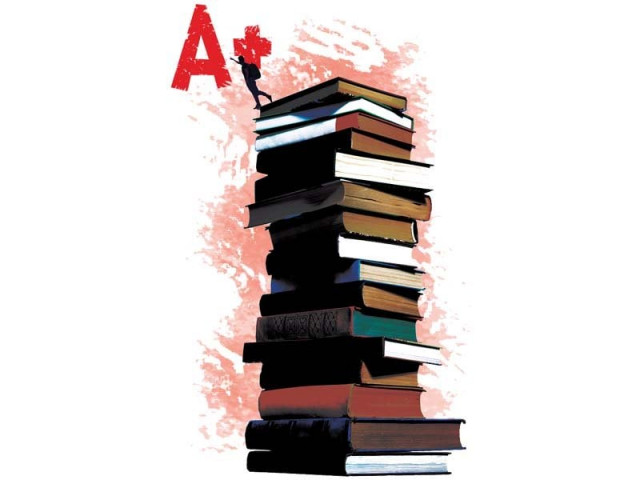Alarming trend: The deadly pursuit of academic excellence
Every year, when schools and colleges release results, suicides among young rise

However, M’s already horrible day did not end there. The slap from her father was followed by insults and comparisons with the children of her parents’ friends and associates, all of whom, she was reminded had passed with flying colours.
The overwhelming embarrassment drove the pre-teen to despair. Quietly, she snuck into her uncle’s room on the second floor of their house and locked herself in. She looked for her uncle’s gun and then took her own life.
As horrible and tragic as it is, M’s story is not unique. Across Pakistan, hundreds of students are driven to suicide by the pressure put on them to perform in exams every year.
“There is a spike in suicide attempts by young people, particularly teenagers, during the result season every year,” Khyber-Pakhtunkhwa police officer Muhammad Ilyas Khan told The Express Tribune. Although he said his department did not have any comprehensive data, the police has noted that there is an uptick in suicide reports the same time every year.
Quality of our academic output
“Around 40 people committed suicide in Chitral last year. Most of them were young men and women,” Peshawar University Psychology Department Chairperson Dr Iram Arshad said. “The main cause of suicide among young people is either harsh behaviour from their parents towards them or corporal punishment in schools,” she said.
According to a World Health Organisation report, around 804,000 people commit suicide every year across the world, representing an annual global age-standardised suicide rate of 11.4 per 100,000 individuals – 15 for men and boys, and 8 for girls and women. Among 15 to 29 year-olds, suicide is the second leading cause of death, the report pointed out.
While up-to-date data on suicide in Pakistan is unavailable, a 2012 WHO report stated that 15,000 Pakistanis killed themselves that year without providing any breakdown according to age and gender groups.
Pertinent to the role of academic pressure on juvenile suicide attempts, a joint survey by Unicef and Save the Children in KP revealed 736 cases of corporal punishment in schools were recorded in Khyber-Pakhtunkhwa in 2015-16 but no further action, not even registration of FIRs, was carried out against teachers said to be involved.
“Parents demand very high academic performance from their children,” stressed Dr Iram. “Everyone wants their children to grow up to be doctors or engineers. No one thinks about their child’s talents and aptitude,” she said.
“There is no psychologist or counsellor in any government school who can talk to students and assess their mental issues,” she said. “Parents also need psychological sessions to guide their kids.”
When approached, the regional manager at Society for the Protection of the Rights of Child (SPARK) Jahanzeb Khan told The Express Tribune that the Khyber Pakhunkhwa government established Child Welfare Protection Unit in 12 district of Khyber Pakhunkhwa but owing to budget constraints, the government closed all the units.
“It is unfortunate to see that the government does not prioritise children’s rights as cases of child abuse, suicide among children, sexual harassment and other cases are reported every day across the country. No concrete steps, however, are taken to address the issue”, Jahanzeb Khan added.
Over 28,000 Pakistanis studying in China
He explained that the cruel practice of corporal punishment is still rampant in schools and it sometimes pushes children to take extreme measures, including suicide.
“Every year, we lose precious and innocent lives but since there is no data available, neither the government nor the private sector can take measures to protect children,” he said.
Imran Takkar, a social rights activists working for child rights said that unfortunately, children are neglected in our society and they are not allowed to speak up in front of their parents.
“It is a matter of children’s well-being but our society does not take mental-health issues seriously. In schools, there is no concept of providing mental and physiological education whereas it is a common practice in the developed world,” Takkar said.
He also added that, at times, parents impose their decisions on the children and burden them with unnecessary demands and expectations which lead to extreme stress. Sometimes, children are not even allowed to play or engage in co-curricular activities. If children fail to perform up to their parents’ expectations, they are subjected to undue mental and physical torture which, in turn, compels them to end their own lives.
Deputy Chairman Child Protection and Welfare Commission Khyber Pakhtunkhwa, Ijaz Khan, agreed and said that each year, cases of children committing suicide is not reported by media and the issue cannot be addressed because there are no statistics available. The practice, however, is quite common.
He further added that the government has established Child Protection Units in 12 districts of Khyber Pakhtunkhwa, including Peshawar, Mardan, Charsadda, Swabi, Swat, Bannu, Buner, Abbottabad, Kohat, Lowe Dir, Bhattagram and Chitral.
“Although these units had to be closed because of budget constraints, the government is working to reopen them,” Ijaz Khan informed The Express Tribune.
“So far this year, more than 200 cases of corporal punishment have been reported and the government has taken strict action against the teacher,” he added.
Ijaz Khan also pointed out that one of the main reasons of suicide among children is the easy access to weapons and other harmful substances like pesticides, sleeping pills and poisonous wheat pills.
*Name has been changed to protect victim’s identity
Published in The Express Tribune, June 30th, 2019.



















COMMENTS
Comments are moderated and generally will be posted if they are on-topic and not abusive.
For more information, please see our Comments FAQ